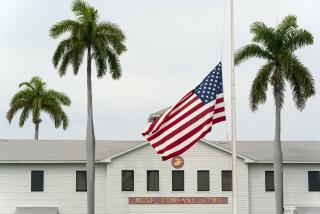Pakistan Frees 3 Staff Members of Nuclear Lab
- Share via
NEW DELHI — Pakistani authorities released a top nuclear scientist and two former army officers Saturday, after having held them in solitary confinement for more than half a year on suspicion that they aided a black market in nuclear weapons.
The men, who were never charged with a crime, worked at Pakistan’s main government nuclear weapons facility under Abdul Qadeer Khan, the father of the country’s atomic bomb, who admitted in February that he sold nuclear weapons technology to Iran, Libya and North Korea from 1989 until at least 2000.
Early Saturday, authorities dropped the three detained members of Khan’s staff at their homes, where they are in effect under house arrest. They are Nazir Ahmed, Khan’s director-general of science and technology; retired army Brig. Sajawal Khan Malik, the lab’s security director; and retired Maj. Islam ul-Haq, Khan’s personal assistant.
Pakistani investigators suspected that at least 11 staff members at the top-secret Khan Research Laboratories in Kahuta, near Islamabad, were involved in the nuclear arms racket. Yet none has been charged after lengthy detentions and interrogations.
Pakistan’s president, and army chief, Gen. Pervez Musharraf, insists that Khan acted without the government’s knowledge or support.
But there is widespread doubt in Pakistan that Khan and anyone who helped him could have circumvented strict security measures for more than a decade.
Musharraf formally pardoned Khan in February after having declared the previous month that anyone involved in leaking Pakistan’s nuclear weapons secrets would be treated with “an iron hand.”
Only one of at least 26 Pakistanis detained in the investigation of the nuclear proliferation remains in detention. He is Mohammed Farooq, Khan’s director-general of foreign procurement, who was taken in for questioning in December.
The three men released Saturday were picked up Jan. 17 and held in solitary confinement at a secret location in sweltering rooms about 10 feet by 12 feet, said Ul-Haq’s brother, Mohammed Hassam ul-Haq.
The temperature in the locked rooms often exceeded 110 degrees, Mohammed ul-Haq added.
“I think that solitary confinement is itself a torture,” he said in a telephone interview from Islamabad, the Pakistani capital.
“He was in there for over six months even though the law says nobody can be held in solitary confinement for more than 15 days,” he said.
Mohammed ul-Haq, who met with his brother at his home Saturday, said Islam ul-Haq developed symptoms of Parkinson’s disease while in detention.
“He has lost a lot of weight,” Mohammed ul-Haq added. “Mentally, he is very much shattered.”
Maj. Gen. Shaukat Sultan, Pakistan’s military spokesman, said the men were returned to their homes because they weren’t needed for further questioning. He added that the investigation was continuing and the men could be interrogated again.
Members of the detainees’ families have protested in the streets and waged legal battles to win their release, insisting that they are scapegoats. The fact that they have not been charged with any crime is proof that they did nothing wrong, Mohammed ul-Haq said.
“I think they did not find anything against them,” he said. “If they had, they would not have released them.”
The government has formally withdrawn the detention orders issued against the three men under Pakistan’s security law, but they must abide by strict conditions that amount to house arrest, Mohammed ul-Haq said. They cannot divulge any official secrets they have learned while working at the Kahuta facility, or during the investigation into the leaks, and they cannot meet anyone without permission from the federal government. They also cannot leave Islamabad, he said.
Musharraf has come under intense criticism in Pakistan for his handling of the nuclear weapons proliferation scandal, and opponents across the nation’s political spectrum -- from Islamic hard-liners to mainstream parties -- say it is more evidence that the president is abusing the rights of national heroes to appease Washington, while protecting senior military officers.
“The United States government has been very biased in this right from the beginning of the episode, right from the beginning of our nuclear program,” Mohammed ul-Haq said, echoing a popular view in Pakistan.
“They didn’t want Pakistan to carry out or continue making advancements in nuclear technology. On the other hand, they set India free to do everything despite the fact that Pakistan has been very friendly and supportive to the United States’ different causes in this region.”
*
Times special correspondent Mubashir Zaidi in London contributed to this report.
More to Read
Sign up for Essential California
The most important California stories and recommendations in your inbox every morning.
You may occasionally receive promotional content from the Los Angeles Times.













